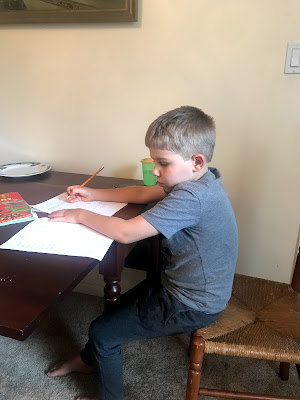Anglo-Saxon Norse Celtic Studies
So Christine has left England to finish her studies at BYU and I am here finishing my degree alone. So I've decided to make my mark on our blog and inform the world about my studies.
I am pursuing a Masters of Philosophy (MPhil for short) in Anglo-Saxon Norse Celtic studies. As the name suggests it incorporates a broad area of emphases from history to ancient languages to paleography to numismatism (studying coins). Specifically I study Insular Latin (that variety used in England), Anglo-Saxon History, and the literary and academic written works of the English, Norse, and Celts (and some Roman) from 300 AD to 1200 AD roughly. So Bede, Beowulf, Norse Sagas, Geoffry of Monmouth, William of Malmesbury, Eusebius, and the lives of many a saint come within our perview.
My dissertation, which will command the majority of my time while here at Cambridge, is taking a very close view of a law code issued by King Cnut and drafted by Archbishop Wulfstan of York in 1020 AD. The code is exceptional and important as a compilation of many ancient laws as well as a basis for future law codes well into the Norman rule. One section of this code outlines the responsibilities of the king toward his people, and I am examining the reason for its inclusion in the code as well as any resulting effects.
Many of my professors are leaders in their fields. My supervisor is the relative of two world-renown Cambridge scholars: great nephew of John Maynard Keynes and great great grandson of Charles Darwin. He has promised me an indepth debate of creationism and evolution, but as yet I've managed to escape.
Actually the Downing College Chaplain, the Reverend Doctor Keith, has been giving lectures on the shape of reality and this past week spent an hour reconciling evolution and creation. His conclusions, always eloquent and frequently beautiful, have allowed me to reflect on God's creation. I am grateful for modern revelation, both personal and to his prophets, gives us a deeper view into the nature of reality than can be reached by logic unaided by inspiration. I attend Bible study every Monday (in lieu of FHE) with Keith, and I have some questions to ask him about his theories.
On thing that continues to amaze me about Cambridge is the amount of green stuff everywhere in the middle of winter. Most grass is just as green now as it was in October, and daffodils and other flowers are even now (in the middle of February) bursting out of the ground and creating beautiful fields of yellow and white across Cambridge. If it weren't for the lack of sunshine, and the constant drizzle, and the inevitable wind, and the ever-constant 40 degree temperatures, I would think it were summer!
 I recently accompanied the Young Adults from the ward to the cliffs of Dover and Canterbury. The trip was a success, eventhough I had not slept the day before because I worked in the Churchill Spring Ball (which was full of Casablanca, chocolate fountains, mountains of stinky cheese, Goldeneye, drunks, and a rousing and extremely talented tour through modern pop music by a drunk piano man who looked like Billy Joel.)
I recently accompanied the Young Adults from the ward to the cliffs of Dover and Canterbury. The trip was a success, eventhough I had not slept the day before because I worked in the Churchill Spring Ball (which was full of Casablanca, chocolate fountains, mountains of stinky cheese, Goldeneye, drunks, and a rousing and extremely talented tour through modern pop music by a drunk piano man who looked like Billy Joel.)
I am pursuing a Masters of Philosophy (MPhil for short) in Anglo-Saxon Norse Celtic studies. As the name suggests it incorporates a broad area of emphases from history to ancient languages to paleography to numismatism (studying coins). Specifically I study Insular Latin (that variety used in England), Anglo-Saxon History, and the literary and academic written works of the English, Norse, and Celts (and some Roman) from 300 AD to 1200 AD roughly. So Bede, Beowulf, Norse Sagas, Geoffry of Monmouth, William of Malmesbury, Eusebius, and the lives of many a saint come within our perview.
My dissertation, which will command the majority of my time while here at Cambridge, is taking a very close view of a law code issued by King Cnut and drafted by Archbishop Wulfstan of York in 1020 AD. The code is exceptional and important as a compilation of many ancient laws as well as a basis for future law codes well into the Norman rule. One section of this code outlines the responsibilities of the king toward his people, and I am examining the reason for its inclusion in the code as well as any resulting effects.
Many of my professors are leaders in their fields. My supervisor is the relative of two world-renown Cambridge scholars: great nephew of John Maynard Keynes and great great grandson of Charles Darwin. He has promised me an indepth debate of creationism and evolution, but as yet I've managed to escape.
Actually the Downing College Chaplain, the Reverend Doctor Keith, has been giving lectures on the shape of reality and this past week spent an hour reconciling evolution and creation. His conclusions, always eloquent and frequently beautiful, have allowed me to reflect on God's creation. I am grateful for modern revelation, both personal and to his prophets, gives us a deeper view into the nature of reality than can be reached by logic unaided by inspiration. I attend Bible study every Monday (in lieu of FHE) with Keith, and I have some questions to ask him about his theories.
On thing that continues to amaze me about Cambridge is the amount of green stuff everywhere in the middle of winter. Most grass is just as green now as it was in October, and daffodils and other flowers are even now (in the middle of February) bursting out of the ground and creating beautiful fields of yellow and white across Cambridge. If it weren't for the lack of sunshine, and the constant drizzle, and the inevitable wind, and the ever-constant 40 degree temperatures, I would think it were summer!
The the words of the prophets, ancient and modern, have been an important source of strength for me these last couple months. I would especially like to bear witness of Genesis 2:18.
.JPG)


Comments
Post a Comment